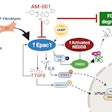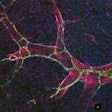
A novel tyrosine kinase inhibitor (TKI), zongertinib, demonstrated clinical benefit with mainly low-grade adverse events in patients with previously treated HER2-mutant non-small cell lung cancer (NSCLC). Results from the multicohort phase 1a/b study, “Zongertinib in Previously Treated HER2-Mutant Non-Small Cell Lung Cancer,” were published in the New England Journal of Medicine.
The clinical trial, Beamion LUNG-1, included multiple cohorts. In the first cohort of 75 patients who had tumors harboring a mutation in the tyrosine kinase domain, oral zongertinib achieved a 71% objective response rate (64% partial responses, 7% complete responses). The median duration of response was 14.1 months, and the median progression-free survival was 12.4 months.
The investigational drug had a confirmed objective response rate of 48% in a cohort of 31 patients who had tumors harboring a tyrosine kinase domain mutation and had previously been treated with a HER2-directed antibody drug conjugate. In another cohort that had 20 patients with tumors harboring a mutation outside the tyrosine kinase domain, the drug received a 30% confirmed objective response.
Only 13 patients in the first cohort, one in the second cohort and five in the third cohort (respectively) experienced grade 3 or higher drug-related adverse events. Researchers reported zero cases of interstitial lung disease (ILD) as an adverse effect, which has been observed in some patients who received trastuzumab deruxtecan (Enhertu) — an antibody drug conjugate approved to treat HER2-mutated NSCLC.
“Zongertinib provided clinically meaningful activity in previously treated patients with advanced non-small cell lung cancer with HER2 mutations, both within and outside the tyrosine kinase domain, including in patients with brain metastases,” said John V. Heymach, MD, PhD, chair of Thoracic/Head and Neck Medical Oncology at MD Anderson Cancer Center in Houston. Dr. Heymach presented the study’s findings at the American Association for Cancer Research Annual Meeting in Chicago.
The purpose of the study, Dr. Heymach said, was to evaluate the drug class in treating NSCLCs that harbor HER2 mutations, which is about 2–4%. Although a small percentage, individuals with the diagnosis have a higher risk of brain metastases and poorer outcomes. Most HER2 mutations occur in exon 20 where the tyrosine kinase domain is located, and zongertinib is an irreversible TKI that selectively blocks HER2 while reducing toxicity.
Charles Rudin, MD, PhD, deputy director of the Memorial Sloan Kettering Cancer Center in New York City, also spoke at the meeting and said zongertinib meets initial benchmarks for the type of drug and stage of clinical development. Based on patients’ good response and tolerance of the drug, Dr. Rudin said zongertinib should be considered as a first-line treatment.























